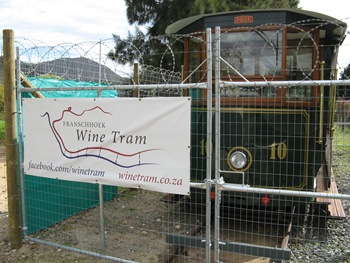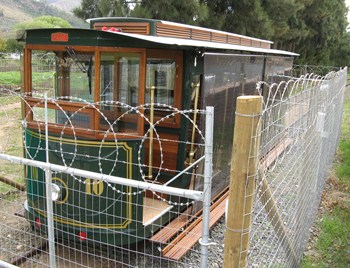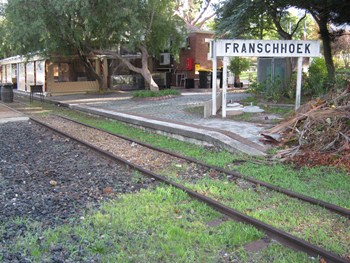


Franschhoek is a charming country town in the Western Cape mountains, east of Stellenbosch and about 75 kilometres from Cape Town. This area was originally settled in 1688 by a small group of refugees from France (the French Huguenots), many of whom were given land in a fertile valley called Olifantshoek ("Elephants' corner"). The prevalence of French-speaking people in the district quickly resulted in the name being changed to Le Coin Français ("the French Corner"), but that didn't last long either - at the time the Cape was overwhelmingly Dutch so the town soon became known as Franschhoek (Dutch for "French Corner").
The turn of the 19'th century was a period of peak railway construction in South Africa. Franschhoek was only a small village but it had become the centre of a major wine-producing area, so a branch line was built there from Paarl to the north and opened in 1904. For the next 90 years at least two trains arrived and departed every day - steam-hauled until 1976 and diesel thereafter. But the ever-increasing popularity of cars and trucks eventually signalled the end and by 1993 all trains to Franschhoek had been withdrawn. The line was abandoned and the stately old station building fell into disuse.
In 2009 Transnet sold Franschhoek station and the building was turned into a restaurant. A shopping centre was constructed next to the station and the disused railway tracks were blocked off and paved over in parts to make roads and a parking area. This seemed to put an end to any hopes of the line ever being used again.
But a group of local people dreamed of seeing trains once again operating over the picturesque route through the Franschhoek valley. After ensuring that the necessary funding was secured and looking at various alternatives, it was decided that a diesel-powered tram was the only viable option on this non-electrified branch line. In January 2011 Prof (Pty) Ltd Engineers, a specialist engineering company in Gauteng, was commissioned to build a new tram similar in design to the open-sided "Brill Trams" of the late 19'th century (one of these vintage models can be seen in the James Hall Museum of Transport in Johannesburg). Although a vintage design was chosen, the tram's propulsion system is entirely modern - an environmentally friendly bio-diesel engine with low carbon emissions and a very sedate top speed of about 20 kilometres per hour. Construction was completed in January 2012 and on 28 February the tram was delivered to Franschhoek.
As at the date of this story the tram has not yet been opened to the public - it is still undergoing extensive testing. But the intention is to start operating in the spring of 2012 (September-November). The tram will do out-and-back trips of about three hours for tourists down a section of the line towards Paarl, including a couple of stops for wine tasting along the way. Approximately 30 passengers can be accommodated on the tram's eight bench seats.

The following is an excerpt from the Wine Tram's web site:
Our aim is to create a tourist icon here in Franschhoek on a par with the Table Mountain Cableway or the Cape Point Funicular, we want the tram to become synonymous with Franschhoek and the wine tasting experience
However, it seems to me that several obstacles must still be overcome:| * | The tram is presently "parked" in a securely fenced area about 500 metres down the line from Franschhoek station, next to Franschhoek Cellars. This is not an ideal place for passengers to board or disembark - there is a loading dock (which is too high) but no platform. |
| * | Franschhoek station would be perfect to use as a base - it is an authentic SA Railways station dating back to the early 20'th century, it is walking distance from the town centre and there is plenty of parking nearby. But it cannot be used in its present state ; the restaurant in the station buildings spills over onto the platform and the tracks themselves (although the obstructions on the tracks could easily be removed). |
| * | The tracks between the station and the fenced parking area for the tram are blocked off and paved over in parts ; extensive work will be required to clear the line for use. However, the tracks have not been lifted and appear intact and in good condition. |
| * | The line crosses several roads via level-crossings. People using these roads have not seen a train for decades and simply drive over the tracks without slowing down or even looking. To cross these roads the tram will have to be extremely careful (the plan is to use "flagmen" to stop the traffic and only allow the tram to proceed when it is safe to do so). |
But none of these issues is insurmountable. The people behind this project have already demonstrated that they have considerable expertise, commitment and (most importantly) funding. To have arranged for the construction of a custom-built tram, got it to Franschhoek and begun testing shows that they are serious. And perhaps the most difficult of all, they have managed to secure permission from Transnet (who own almost all public railway lines in South Africa) to use their tracks for a privately-run tourist train! That is an impressive list of achievements.
I therefore think that we can indeed look forward to enjoying sedate rail journeys from the historic station through the scenic Franschhoek valley in the not too distant future. I congratulate all the people involved on the work they've done so far and wish them the very best of luck. When the tram finally opens for business I'll be there!
The Wine Tram
Franschhoek
Western Cape
South Africa
Phone +27 21 300 0338
EMail info@winetram.co.za
Web www.winetram.co.za
[Update] I was in Franschhoek a year after I wrote this article and enquired about travelling on the Wine Tram. The way it works is that you are taken by BUS around town and to a few wine estates, and only after some wine-tasting do you get dropped at the TRAM embarkation point. The tram then takes you to a couple more wine estates ; the whole trip apparently takes four to five hours and costs R150 per person. I did not want to sit on a bus or do any wine-tasting, but I was told that you cannot do the tram ride alone - you have to take the bus.
This was extremely disappointing to me and (may I say) very short-sighted on the part of the tram operators. I did not have five hours - all I wanted was the tram ride. Surely they could have allowed this? The tram was going back and forth every 40 minutes anyway ; why not allow people to do this part alone and cut out the bus if they wanted to? R150 for a half-hour ride is excessive but I may even have been prepared to pay this. But no, "you have to take the bus". The end result was that I declined the offer.
I understand that setting up the tram operation must have been a prohibitively expensive exercise and the owners (presumably a consortium of wine estates) would like some return on their investment - hence the notion of taking passengers to the various estates for wine-tasting (and hopefully also wine-purchasing). Fair enough. But what about the people who don't have five hours to spare, or do not want go wine-tasting? Why not let them ride the tram for (say) R50 per person? Surely that is better than nothing? I would have thought so, but unfortunately that isn't how it works ...
 © Paul Kilfoil, Cape Town, South Africa
© Paul Kilfoil, Cape Town, South Africa